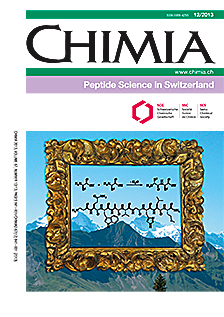Adaptive Peptide Design
DOI:
https://doi.org/10.2533/chimia.2013.859Keywords:
Antimicrobial peptide, De novo design, Epitope, Mhc-i, Machine learning, Membrane interaction, Molecular similarityAbstract
Computer algorithms help in the identification and optimization of peptides with desired structure and function. We provide an overview of the current focus of our research group in this field, highlighting innovative methods for peptide representation and de novo peptide generation. Our evolutionary molecular design cycle contains structure–activity relationship modeling by machine-learning methods, virtual peptide generation, activity prediction, peptide syntheses, as well as biophysical and biochemical activity determination. Such interplay between computer-assisted peptide generation and scoring with real laboratory experiments enables rapid feedback throughout the design cycle so that adaptive optimization can take place. Selected practical applications are reviewed including the design of new immunomodulatory MHC-I binding peptides and antimicrobial peptides.Downloads
Published
2013-12-18
Issue
Section
Scientific Articles
License
Copyright (c) 2013 Swiss Chemical Society

This work is licensed under a Creative Commons Attribution-NonCommercial 4.0 International License.
How to Cite
[1]
G. Schneider, Y.-C. Lin, C. P. Koch, M. Pillong, A. M. Perna, M. Reutlinger, J. A. Hiss, Chimia 2013, 67, 859, DOI: 10.2533/chimia.2013.859.







